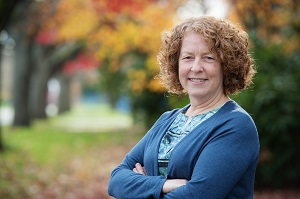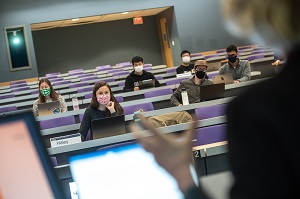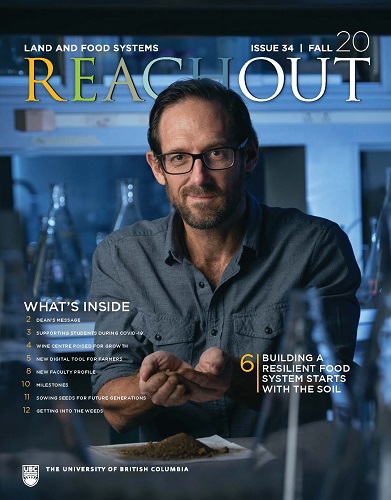Supporting Students During COVID-19
Some quick pivots took place in the summer as the university prepared for online teaching and learning.
Health and Wellness for All UBC Students
In May, UBC wanted to support students coming from an unusual COVID-19-impacted end to secondary school with the creation of three online courses aimed at helping students succeed in first year and beyond. These courses were later coined Academic Essentials – and focused on reading/writing, math and student wellness.
Gail Hammond, an Assistant Professor of Teaching in LFS, takes a deep interest in student well-being. She has been co-chair of the Teaching and Well-being Community of Practice that straddles UBCV and UBCO since 2018. Her CoP co-chair is Michael Lee, Associate Professor of Teaching in the Faculty of Medicine.
Hammond and Lee were joined by one other faculty and two staff members from both UBC campuses in preparing rich, online content. The team quickly mobilized to create one of the Academic Essentials courses called Live Well to Learn Well, which provides students with strategies for self-care, stress management and learning effectively.
“I had never created an entirely online course from the ground up, let alone in about six weeks,” says Hammond. “But we had an incredible team and, when all was said and done, over 2,000 incoming students registered in the course. The post-course analytics show students were deeply engaged in the activities and appreciative of the opportunity to build community before stepping over the threshold of starting their all-virtual first classes in September.”
The two other Academic Essentials courses are Reading and Writing at University and Readiness for University Mathematics. Overall, one-third of UBC’s incoming students enrolled in Academic Essentials, and UBC sees great value in using these free, online bridging courses in the future.
Transition for New LFS Students
LFS Student Services wanted to create a transition program for new-to-LFS undergraduate students and received backing from the UBC Teaching and Learning Enhancement Fund in early 2020; the group planned to develop and launch the program in September 2021. Due to COVID, the team moved up their timeline aggressively, launching 15 months early to support more than 500 incoming students.
Using the UBC Canvas platform, ROOTSS (Reach Out, Orientation, Transition and Study Skills), is an online and interactive program that helps students adjust to UBC and introduces them to the LFS community. During the summer, ROOTSS launched weekly content, affectionately called ‘Module Mondays’, leading up to the start of classes. These modules highlighted registration and student resources, academic tips, career planning advice, and enabled engagement between LFS students, faculty and staff, via videos, webinars, and discussion boards.
The ROOTSS Canvas content averaged close to 1,500 page views a day, and students reported a high level of engagement and benefit from participating. The Student Services team is currently assessing the success of this early launch and using lessons learned to develop ROOTSS 2021.
New Studio, Flexibility are Keys to Teaching in Professional Program
Flexibility and being prepared for any situation – face-to-face teaching or 100% online teaching – has been important for instructors in the Master of Food and Resource Economics (MFRE) program, says Director Kelleen Wiseman.
“If things get better we’re prepared to move fully face-to-face and if things get worse, we’ll reduce our face-to-face teaching. Whatever happens we’re are doing it at the highest quality.”
The program is being taught using a hyflex model – a mix of online and in-person teaching.
The MFRE team hatched the idea of developing a studio to improve online course delivery and allow instructors to focus on content rather than managing technology. They converted a room in MacMillan into a professional-level recording studio, drawing upon audio visual expertise from Sauder, the LFS Learning Centre and UBC Learning Spaces. UBC AV also helped test the sound, and suggested methods to reduce echoes, such as adding wall padding and additional rugs.
Important to the studio development was the hiring of Natalya Lebedeva, MFRE Production Coordinator, who transformed the space by purchasing, setting up, testing, and optimizing equipment to accommodate both live stream and prerecorded lectures for Food and Resource Economics professors. The studio now includes a ‘confidence’ screen where instructors can see what the students see, a drawing tablet, gallery and instructor screens, as well as high-quality cameras and microphones.
Two-thirds of the 35 students in this one-year professional program are international, and all made the decision to move to Vancouver to experience the MFRE program. So, in addition to the online component, Wiseman and instructors Rick Barichello and Jim Vercammen are teaching in-person to provide a personal experience.
Working with Steven Lee and Jodi Scott, UBC Facilities Planning, MFRE booked a spacious, well-designed classroom that allows their students to safely maintain physical distance and follow all COVID protocols. The MFRE cohort is divided into two groups and all three instructors deliver their inperson classes twice. Students are happy and adapting well to this unique and productive setting.


